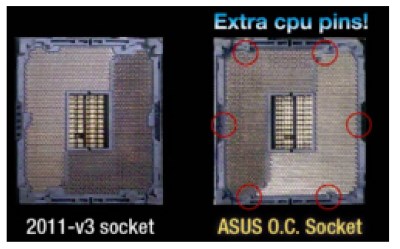
The Socket 2084 is manufactured by Foxconn and isn't exclusive to ASUS, a new LN2 cooling optimized motherboard from Gigabyte showed up that uses the exact same special socket. Serious questions are being raised about the functionality of the extra pins and there are currently two theories.
The first possibility is that these pins are indeed real additional power and ground pins that could result in better overclocking performance. An anonymous trusted industry source however claimed that these pins are just marketing rubbish as their only functionality is debug and testing. If this second possibility is true, these pins would be useless for overclocking and could even pose a stability risk in production systems:
So, Gigabyte can get hold of this same socket, the question is what do those additional pins connect to. If the first possibility stated above is correct, i.e. that these are real additional power, ground etc. pins that allow better and more reliable OC, then Asus has no way to patent these as it directly links to Intel IP including the socket and its validation.
If, however, it is the second possibility, of test, debug or no-connect pins being exposed, then it is a serious marketing rubbish which could be used to deceive the high-end buyers, whom both Intel and its key OEMs, which Asus and Gigabyte are, surely cherish and treasure. And mind you, this is already in a product on the market, the Asus top end Rampage V Extreme.

The other major question is what the warranty implications are of using Intel Haswell-E processors in sockets with undocumented pins. The pins leave a visible mark on the processor so enthusiasts are worried that Intel may not honor the warranty on processors used in these sockets.
In related news, last weekend there were two reports of X99 based motherboards going up in smoke. Phoronix witnessed the death of an MSI X99S SLI Plus while Legit Reviews had the ASUS X99 Deluxe motherboard go up in smoke. Phoronix didn't have a backup motherboard to test if the processor was still functional but in Legit Reviews' case the Core i7-5960X processor was killed as well.
It could be just an unfortunate coincidence but it's pretty strange to see two high-end X99 motherboards go up in smoke that early after launch.